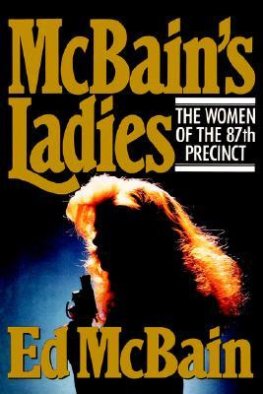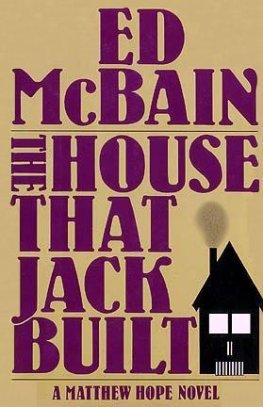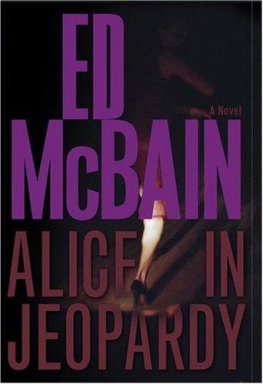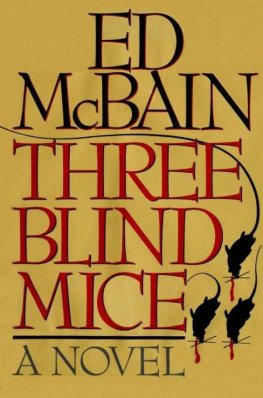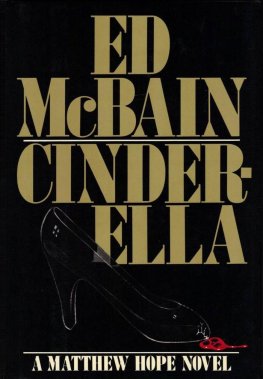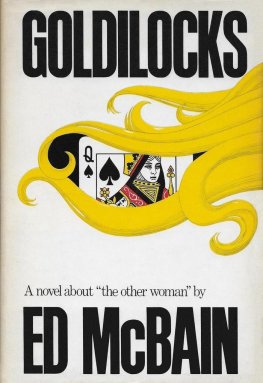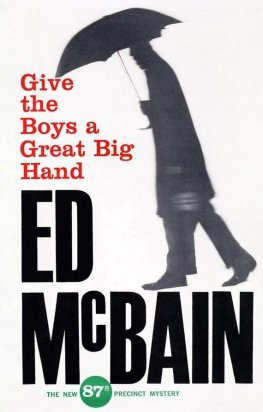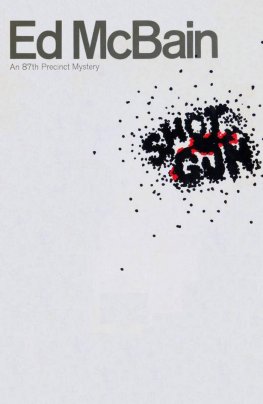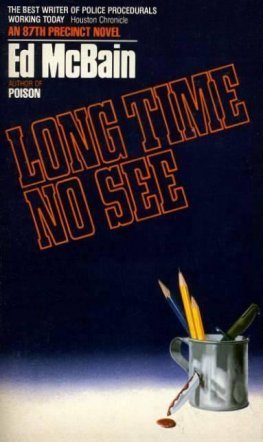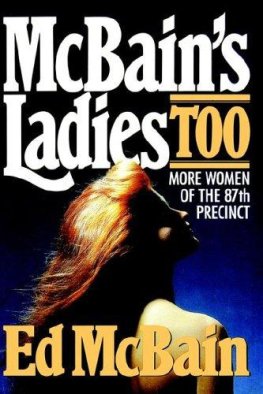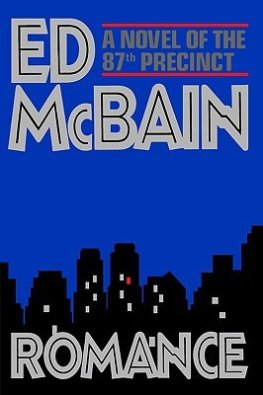The city in these pages is imaginary.
The people, the places are all fictitious.
Only the police routine is based on established investigatory technique.
Nobody thinks about death on a nice spring day.
Autumn is the time for dying, not spring. Autumn encourages macabre thoughts, invites the ghoulish imagination, tempts the death wish with sere and withered evidence of decay. Autumn is poetic as hell, brief, succinct, stinking of mold and ashes. People die a lot in autumn. Everything dies a lot in autumn.
Nothing is allowed to die in the spring. Theres a law that says soPenal Law 5,006, DEATH IN THE SPRING: Whosoever shall expire, or cause to expire, or conspire to expire, or harbor thoughts of expiring during the vernal equinox shall be guilty of a felony punishable by It goes on like that. It absolutely forbids death between March 21 and June 21, but there are lawbreakers everywhere, so what can you do?
The man who stepped out of the office building on Culver Avenue was about to become a lawbreaker. Normally, he was a good citizen, a hard-working man, a faithful husband, a devoted father, all that jazz. He had no intention of breaking the law. He didnt know that death was forbidden by legislature, but even if he had known, it wouldnt have concerned him, because death and dying were the furthest things from his mind on that bright spring day.
He was, in fact, thinking of life. He was thinking that next week was his birthday, that he would be forty-five years old, that he didnt feel a day over thirty-five. He was thinking that the gray at his temples added a corny but distinguished touch to his noble head, that his shoulders were still broad, that his twice-weekly tennis sessions had eliminated an alarming little potbelly, and that he would lay his wife the moment he saw her, even if theyd never be allowed to eat at Schraffts again.
He was thinking all these things when the bullet sang across the open, fresh, spring air, spiraling wickedly, unglintingly, unerringly accurate as it traversed the area from the roof of the building across the street, high above the tops of the beetle cars and the heads of the ant people enjoying spring, fast, true, deadly, to the sidewalk opposite, to hit him between the eyes.
Only one thought flashed into his mind the second the bullet struck, and then all thought ceased. He felt a single sharp shattering blow between his eyes and he thought for a split instant that he had walked into the glass doors that separated the building from the street outside. The bullet splintered through bone, found the soft cushion of his brain, and then blew a hole the size of a baseball through the back of his head as it passed on through. Thought stopped, feeling stopped, there was suddenly nothing. The impact sent him reeling back three feet to collide with a young girl in a yellow cotton frock. He fell backward as the girl reflexively sidestepped, his body seemed to fold in on itself like a battered accordion, the tennis muscles relaxed, he was dead even before he hit the pavement. The large hole below his forehead leaked a tiny trickle of blood while the enormous exit hole at the base of his skull poured blood onto the sidewalk steadily, wetly, redly, a blinding, screaming red still hot with life, flowing swiftly to where the girl stood in shocked and dumb horror, watching the stream of blood as it rushed across the sidewalk.
She pulled back her foot just in time; in another moment, the blood would have touched the toe of her high-heeled pump.
Detective Steve Carella looked down at the body on the sidewalk, and wondered how it could be that ten minutes ago when he left the precinct there were no flies, it was too early in the season for flies, and that now, as he looked down at the dead man whose blood had stopped flowing, the pavement was covered with flies, there was a swarm of flies in the air, and another half-dozen flies were feeding at the open hole between the mans eyes.
Cant you cover him up? he snapped at one of the interns, and the intern shrugged and gestured innocently toward the police photographer who was putting another roll of film into his camera in the shade of the ambulance parked at the curb.
Without looking up, the photographer said, Got to take his picture.
Carella turned away from the body. He was a tall man with a fine-honed muscular appearance, high cheekbones, his brown hair cut sparingly, his brown eyes slanting peculiarly downward to give his face a pained and suffering oriental look as he turned into the sun, squinting, and walked to where the girl in the yellow frock was talking to several newspaper reporters.
Later, boys, he said, and the newspapermen, oddly quiescent in the presence of death, faded back into the circle of bystanders beyond the fringe of patrolmen.
How do you feel? Carella asked.
All right. Gee, she said. Gee.
Do you feel like answering a few questions?
Sure. Gee, I never saw anything like this in my life before. Waitll I tell my husband.
Whats your name, maam?
Mrs. Irving Grant.
Your first name?
Lizanne. With a z.
And your address, Mrs. Grant?
1142 Grover. She paused. Thats below First.
Mmm, Carella said, jotting the address into his book.
I mean, in case you thought I lived in a Puerto Rican neighborhood.
No, I didnt think that, Carella said. He was suddenly very tired. There was a dead man covered with flies on the pavement, and a possible witness to the shooting was worried about whether or not he would think she lived in a Puerto Rican neighborhood. He wanted to explain that he didnt give a damn whether she lived in a Puerto Rican neighborhood or a Czechoslovakian neighborhood, so long as she could tell him, with minimal emotion and maximal accuracy, what she had seen happen to the dead man, who no longer had a nationality. He gave her an over-the-pencil glance that he hoped was withering enough, and then he said, Can you tell me what happened?
Who is he? Mrs. Grant asked.
We dont know yet. We havent looked him over for identification. Im waiting until the photographer is finished. Can you tell me what happened?
I was just walking along when he bumped into me. She shrugged. Then he fell down, and I looked at him, and he was bleeding. Gee, Im telling you, I never
What do you mean he bumped into you?
Well, he backed into me, really.
Hed been shot already, is that it? And he fell backward against you?
I dont know if hed been shot. I guess he had.
Well, did he stumble backward, or fall, or what?
I dont know. I wasnt paying any attention. I was walking along, thats all, when he bumped into me.
All right, Mrs. Grant, what happened then?
Then he just fell over backward. I moved away from him, and I looked down at him, and that was when I saw he was bleeding, and I knew he was hurt.
Whatd you do?
I dont know what I did. I just kept looking at him, I think. She shook her head. Waitll I tell my husband about this.
Did you hear the shot, Mrs. Grant?
No.
Youre certain you didnt hear anything?
I was walking along thinking my own thoughts, Mrs. Grant said. I didnt expect a thing like this to happen. I mean, maybe there was a shot, maybe there were six shots, Im only saying I didnt hear anything. He bumped into me all of a sudden, and then he fell down, and there was blood all over his face. Urghh. Mrs. Grant grimaced at the memory.
I dont suppose you saw anyone with a gun?
A gun? No. A what? A gun? No, no.
I know you were busy thinking your own thoughts before the man got shot, but afterward, Mrs. Grant? Did you see anyone in one of the windows across the way, or perhaps on the roof of one of the buildings? Did you notice anything unusual?


